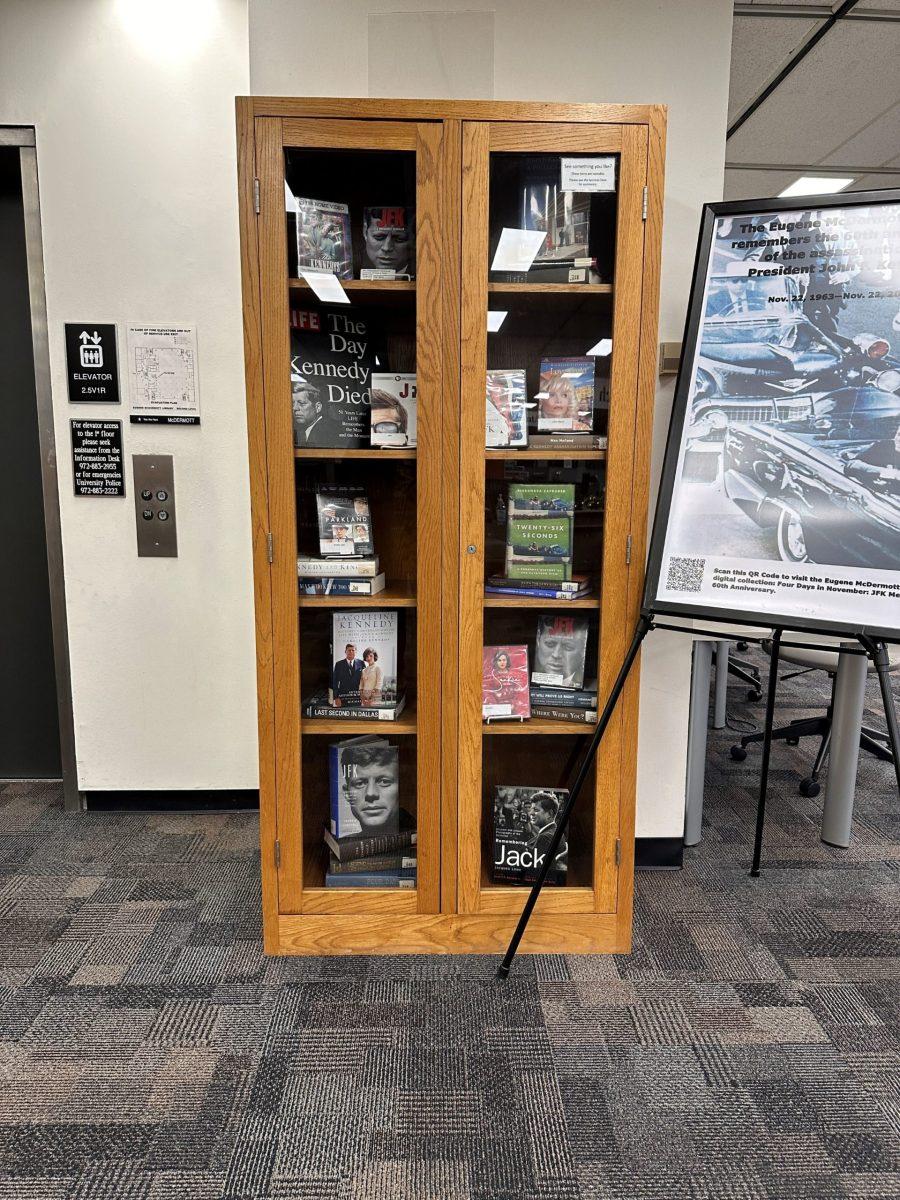Paying tribute to the 60th anniversary of John F. Kennedy’s assassination, the McDermott Library provided a public collection of books, government reports, feature films, and documentaries.
On the same day that hundreds gathered in Dealey Plaza for the anniversary of Nov. 22, 1963, the McDermott library put out 32 items from within the library on public display to commemorate Kennedy’s life and presidency. The collection includes two letters provided to JFK, suggesting an interaction with the Graduate Research Center of the Southwest – which would later be known as UTD. Five librarians collaborated to create the collection, including head of information literacy services Loreen Henry, senior librarian Matt Makowka, senior librarian Alexander Rodriguez, research services librarian Laren Anderson, digital archivist Molly Tepera and instruction librarian Sarah Dornback.
“[The items] represent a broad range of the assassination, the conspiracies, the presidency of JFK, his wife and his family,” Henry said.
The chosen selection on display represents a fraction of a vast collection, which includes JFK’s flight records at the Aviation Museum and several documented artifacts and letters found in the Special Collection & Archives. It makes for one of the most comprehensive collections of JFK’s death, which when put together, tell the greater story of JFK’s address to UTD.
JFK considered visiting UTD, but his advance man Gerry Bruno claimed it was too far away from Dallas to be practical on Oct. 31, 1963. Even so, local political leaders and campus public relations tried to bring JFK to UTD due to its aerospace research, which would eventually play a role in the space race. A helicopter escort was reportedly considered to make up for the distance. In the end, Texas Governor John Connally convinced JFK to visit the Dallas Trade Mart Nov. 22 for political and theatrical appeal.
Following this change, founders Erik Jonsson and Lloyd Berkner and sent a letter Nov. 20 to become lead sponsors at the Dallas Trade Mart, inviting JFK and his party for a luncheon at noon alongside members of the Dallas Assembly and Dallas Citizens Council.
“It was really important at that time in the 60’s and 70’s for the United States to become part of the emergence of space and technology. Of course, the founders of UT Dallas fully embraced that when creating the Southwest campus,” Henry said. “They recognized that it was very important for the United States to be competitive on the world stage, and we know JFK embraced that. He [even] knew Jonsoson and Green.”
So while JFK’s final itinerary never included campus, its representatives would still have met with JFK had he not been assassinated. JFK’s drive downtown landed him in the crosshairs of Lee Harvey Oswald, who at 12:30 a.m. fired the first shot that killed JFK.
At the luncheon event, over 2,500 were in attendance when Jonsson made the announcement JFK had been injured. Within the next few minutes, Jonsson corrected himself and ended the event. Within the next few days of the luncheon, Berkner provided distributed copies of JFK’s original speech to the scientists and faculty as obtained by the Associated Press, alongside his own personal note addressing the campus.
“We are all stricken with grief by the events of the day of tragedy, November 22, 1963. That the President was here as the personal guest of our institution can only deepen our sense of mourning,” Berkner said. “His first words were to have been about the Center and its place in the development of the social fabric of our nation.”
While the tribute collection presented this year does not host those speeches, it does records and a newspaper from the era of the assassination. Several documentaries and even the video recording JFK’s assassination are presented in the collection.





